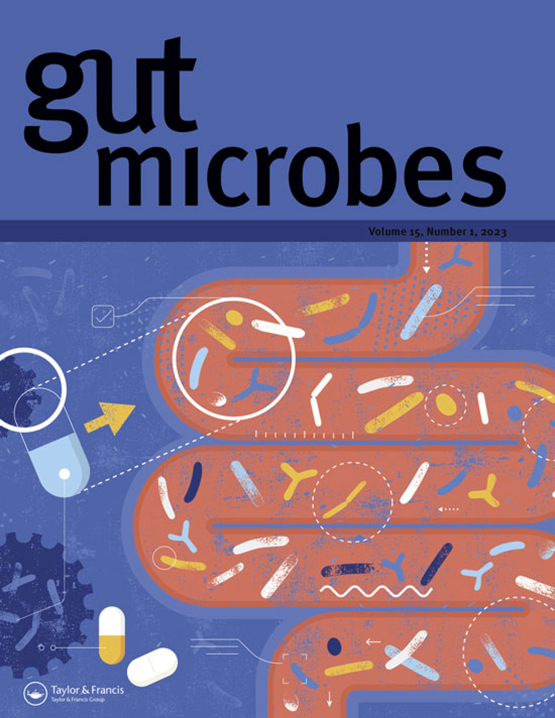Submit a Manuscript to the Journal
Gut Microbes
For an Article Collection on
Computational and Systems Biology Approaches to Modelling Gut Microbiota
Manuscript deadline


Article collection guest advisor(s)
Dr. William Scott,
Wageningen University & Research, Netherlands
wtscott@ucdavis.edu
Dr. Clara Belzer,
Wageningen University & Research, Netherlands
clara.belzer@wur.nl
Computational and Systems Biology Approaches to Modelling Gut Microbiota
The human gut microbiota plays a crucial role in health and disease, affecting digestion, metabolism, immune function, and even psychological well-being. Understanding the complex ecological dynamics and functional capabilities of gut microbial communities presents substantial scientific challenges. Computational and systems biology approaches have emerged as indispensable tools to unravel these complexities by integrating data across multiple biological scales—from genomes and metabolic pathways to host-microbe interactions. Recent advances in bioinformatics, machine learning, dynamic modelling, and multi-omics data integration are rapidly transforming our ability to predict, analyze, and manipulate gut microbiota composition and activity. This Collection will highlight innovative computational methodologies and their applications to decipher the intricate relationships within the gut microbial ecosystem.
Understanding the gut microbiota has far-reaching implications for human health, influencing conditions ranging from inflammatory bowel diseases and obesity to neurological disorders and cancer. However, due to its inherent complexity and variability, direct experimental characterization of gut microbiota is often challenging, costly, and incomplete. Computational approaches offer powerful alternatives, enabling researchers to generate and test hypotheses in silico, design targeted experiments, and personalize microbiome-based therapies. By modelling the microbiota with advanced computational methods, we can uncover novel biomarkers, predict dysbiosis, and develop interventions tailored to individual microbial profiles. This approach not only accelerates fundamental discoveries but also opens new avenues for precision medicine and personalized healthcare solutions.
We invite submissions encompassing a wide range of computational and modelling methodologies relevant to gut microbiota research, including but not limited to:
- Genome-scale metabolic modeling and constraint-based analyses.
- Multi-omics data integration and systems biology modeling.
- Dynamic and mechanistic modeling of microbial community ecology.
- Machine learning and artificial intelligence applications in microbiome research.
- Agent-based and spatial modelling of microbiome–host interactions.
- Statistical and computational frameworks for microbiome data analysis.
- Network-based modelling of microbial interactions and host–microbiome crosstalk.
- Computational modelling of diet–microbiome–host dynamics.
- Bioinformatics tools for microbiota profiling and functional prediction.
- Modelling therapeutic interventions and microbiome engineering.
This Collection welcomes various article types, including original research, methods papers, reviews, and perspective articles, aiming to bridge theoretical advancements with practical implications for human health.
Keywords
- Computational Biology
- Gut Microbiota
- Systems Biology
- Machine Learning
- Multi-omics Integration
All manuscripts submitted to this Article Collection will undergo a full peer-review; the Guest Advisor for this Collection will not be handling the manuscripts (unless they are an Editorial Board member).
Please review the journal scope and author submission instructions prior to submitting a manuscript.
The deadline for submitting manuscripts is 15 March 2026.
Please contact Zhiyuan Zhang at zhiyuan.zhang@taylorandfrancis.com with any queries and discount codes regarding this Article Collection.
Please be sure to select the appropriate Article Collection from the drop-down menu in the submission system.
Guest Advisors
Dr. William T. Scott is a postdoctoral researcher at Wageningen University & Research, where he applies computational systems biology approaches to study microbial communities relevant to gut health and biotechnology. His work focuses on genome-scale metabolic modeling and synthetic consortia design, with an emphasis on probiotic compound production and microbiome-host interactions. Trained as a biological and chemical engineer, he is particularly interested in developing reproducible modeling workflows that support mechanistic insight into gut microbial dynamics.
Dr. Clara Belzer is PI of the Microbes Mucus and Milk team at the Laboratory of Microbiology, Wageningen University and Research, The Netherlands. Research is focused on how the host-microbial symbiosis is shaped by host produced and dietary glycans. To this end studies are performed on from a microbiology point of view culturing gut microbes, synthetic communities and natural communities to explore the physiologic potential of microbes for human health.
Benefits of publishing open access within Taylor & Francis
Global marketing and publicity, ensuring your research reaches the people you want it to.
Article Collections bring together the latest research on hot topics from influential researchers across the globe.
Rigorous peer review for every open access article.
Rapid online publication allowing you to share your work quickly.
Submission Instructions
All manuscripts submitted to this Article Collection will undergo desk assessment and peer-review as part of our standard editorial process. Guest Advisors for this collection will not be involved in peer-reviewing manuscripts unless they are an existing member of the Editorial Board. Please review the journal Aims and Scope and author submission instructions prior to submitting a manuscript.
